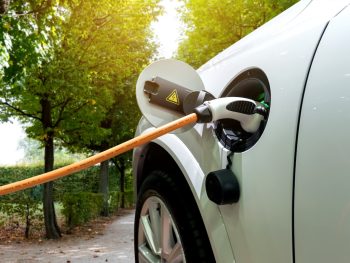UK government confirms ZEV mandate review after car industry reprisals
The UK government has confirmed it will run a “fast-track consultation” on its zero emission vehicle (ZEV) mandate following a backlash among vehicle makers.

The Business Secretary will launch a review of the ZEV mandate put in place by the previous administration
Speaking last night at the annual Society of Motor Manufacturers and Traders (SMMT) dinner, Business and Trade Secretary Jonathan Reynolds said he was “profoundly concerned” by the current state of the market and would launch a review of the electric vehicle sales targets put in place by the previous Conservative administration.
The Department for Business and Trade has confirmed that the Business Secretary will be updating Parliament on this late today.
But Labour has said it remains fully committed to reinstating the 2030 deadline for ending pure petrol and diesel sales.
Reynolds’ comments follow a meeting last week held by Transport Secretary Louise Haigh that saw vehicle makers such as Stellantis, Nissan and Ford warn of “irreversible damage” from the EV rules.
Since then, Stellantis has announced a proposal to close its 120-year-old Luton plant, “within the context of the ZEV mandate”, putting over 1,000 jobs at risk.
And Ford announced plans last week to cut 800 jobs in the UK under a European restructure as the industry faces “unprecedented competitive, regulatory and economic headwinds”.
Speaking to the auto sector at the SMMT dinner, the Business and Trade Secretary said the Government had “heard you loud and clear”.
“We will be consulting with you and give clarity on direction of travel. We need this transition to be done in partnership with government, industry and consumers.”
The UK automotive sector has called for “urgent market intervention as weak demand and unsustainable business costs undermine UK industry”.
The SMMT has warned that weak demand for EVs and the need to fulfil the rising ZEV mandate sales quotas will cost the industry some £6bn in 2024, and even more next year – with “the potential for devastating impacts on business viability and jobs”.
In a statement, the SMMT said: “The mandated targets have given manufacturers no option but to subsidise sales, incentivising fleet, business and consumer EV sales through an estimated £4bn worth of discounts Despite this, the industry looks likely to fall short of the 22% EV market share demanded, potentially creating a £1.8bn bill for compliance for those missing their targets for cars alone, either to government or to competitors, most of whom manufacture their EVs abroad.
“Van manufacturers will face further costs, with market demand drastically behind the ambition set by the mandate.”
Nissan warned last week that missing the ZEV mandate target will result in significant fines for manufacturers unless credits are purchased from EV-only brands – none of which manufacture in the UK, “meaning the UK automotive industry will effectively be subsidising EV sectors in other countries, at the expense of investment in Britain”.
Review expected to lead to new ZEV mandate flexibilities
According to reports, government ministers are refusing to back down on the deadlines for the penalties and are holding firm for now on the level of the fines but are open to new “flexibilities”.
The ZEV mandate became law in January 2024, requiring zero-emission vehicles to make up increasing proportions of new car and van sales in the run-up to the ICE ban. For 2024, this is set at 22% of all new cars sold and 10% for vans, with a potential fine of £15,000 per non-EV sold, although vehicle makers can also comply with the mandate by reducing CO2 emissions from petrol and diesel sales, borrowing credits from future targets, and purchasing credits from other carmakers.
According to research organisation Rho Motion, only BMW, Mercedes and Geely are expected to meet the full 2024 ZEV mandate for cars. Major car manufacturers such as Toyota and Ford are expected to meet the 2024 minimum compliance level for cars but fall short of the full 2024 ZEV mandate which could lead to financial penalties, although they have flexibilities at their disposal. Ford has also warned that it could pull sales of ICE cars to meet targets.
Paul Hollick, chair of the Association of Fleet Professionals, said that it had become clear that the ZEV mandate needs to change, “however well-meaning its intentions”.
“It is good news that the Government has recognised this fact relatively soon after being elected and appears to be taking the issue seriously. It is also positive that the consultation announced by Jonathan Reynolds last night will be concluded quickly.”
But he warned that the real test of the government would lie in the changes that it chooses to make.
“From a fleet point of view, we believe that while the car element of the ZEV mandate requires some moderation, vans are the real issue. Electric van sales have been flatlining at around 5% for over a year and the reasons for this are that the practical limitations of the available models – range, payload, charging facilities – make them unsuitable for many operators.
“Because of these factors, we’re in a situation where, no matter what percentage of new vans manufactured are electric, large numbers of our members are planning to stick with their existing diesel vans for the foreseeable future. Making fleets hang onto older, more polluting vehicles for longer is obviously not what the Government intends.”
Hollick said it was potentially a concern that the Government says it remains fully committed to the 2030 deadline for ending pure petrol and diesel sales “because there will probably need to be some flexibility, even if just around the definition of hybrids”.
“Fine-tuning the ZEV mandate probably won’t improve the overall situation. Instead, more direct, radical action is needed if we’re to avoid more factory closures of the type announced by Stellantis.”
Fleet operator Addison Lee said the “planned watering down” of the ZEV mandate was “clear evidence that the electric vehicle market is not where it needs to be, creating further pressures for fleet operators considering the shift to electric”.
But ChargeUK, which represents the UK’s EV charging operators, said it was “foolish” to alter the zero-emission sales targets.
Vicky Read, CEO of ChargeUK, said: “Government could not have been clearer last week in its meeting with the automotive and charging industries that there would be no tinkering with the percentages of electric cars that must be sold ahead of 2030. Any backsliding on that risks inducing the uncertainty that all sides agreed is the very enemy of the EV transition.
“Billions of pounds of investment in the EV charging infrastructure rollout will be put at risk should the ZEV mandate be redrawn. This would be particularly foolish given the charging industry is busy deploying the infrastructure that is essential for the automotive sector to sell EVs and for the UK to meet its net zero goals.”
And Octopus Electric Vehicles called for the Government to stand firm.
Fiona Howarth, CEO of the EV leasing specialist, said: “The Government has two clear aims – to keep rolling out clean electric cars, and make many of them. The ZEV mandate is working – sales are up by 14%, and every second driver today wants their next car to be electric.
“EVs are already six times cheaper to run than petrol cars for those with a driveway, and private investors have committed £6bn to further strengthen the public charging network.
“Manufacturers that failed to invest in the future are now facing challenges. To secure long-term jobs in the sector, the Government must hold firm on the ZEV mandate and invest in targeted support for manufacturers committed to the electric transition and jobs in the UK.
“Changing the mandate would mean shooting ourselves in the foot by bowing to the pressure of a few laggard companies.”
The Climate Group has warned of impacts on decarbonisation and UK business investment.
Dominic Phinn, head of transport, said: “As the UK government launches its ZEV mandate consultation, policymakers need to ask themselves a simple question: are they prepared to risk the incredible progress the UK has made in moving towards a cleaner, more sustainable transport system?
“Any changes to this world-leading legislation will seed uncertainty among businesses – threatening investments, business cases, and the clear and confident path so many companies across the country have put themselves on.
“There is absolutely no need for a relaxation. Contrary to intense lobbying from a small number of carmakers over recent weeks and months, demand for EVs is strong and growing. While sales of petrol and diesel cars are stalling, EV sales now account for 18% of the global market. The country’s leading companies need both the volume and the variety of models the ZEV mandate guarantees, as do British drivers who deserve their next car to be electric.”
Finally, speaking earlier this autumn as part of Climate Week NYC, Professor Tim Lenton, University of Exeter, said mandates were the most powerful and effective policy to drive decarbonisation, by “bringing forward positive tipping points not just in their sector, but across sectors” and by being able to “really stimulate innovation”.


